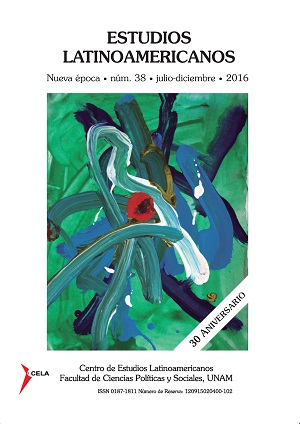Chavismo features in Venezuela’s political culture
Main Article Content
Abstract
Downloads
Article Details
Citas en Dimensions Service
References
Bibliohemerografía
BOECKH, Andreas, Friedrich WELSCH, Nikolaus WERZ (compiladores) (2011), Venezuela heute. Politik, Wirtschaft, Kultur, Frankfurt/Main.
BORCHERT, Jens (2006), Personalisierung und repräsentative Demokratie: Wie viel Persönlichkeit verträgt die Demokratie. Dirección URL: , [consulta: 23 de mayo de 2007].
DALTON, Russell (2006), Citizen Politics. Public Opinion and Political Parties in Advanced Industrial Societies, Washington D. C.
DATANÁLISIS (2015), Encuesta Nacional Omnibus, Venezuela, julio-agosto.
DE LA TORRE, Carlos (2000), Populist Seduction in Latin America: The Ecuadorian Experience, Ohio, Athens.
HERMET, Guy (2003), “El populismo como concepto”, en Revista de Ciencia Política, Chile, vol. XXIII, núm. 1.
KNIGHT, Alan (1998), “Populism and Neo-Populism in Latin America, Especially in Mexico”, en Journal of Latin American Studies, vol. 30, núm. 2.
KNUTSEN, Oddbjorn (2007), “The Decline of Social Class?”, en Dalton RUSSEL, Hans Dieter
KLINGEMANN, The Oxford Handbook of Political Behaviour, Oxford.
LACLAU, Ernesto (2005), La razón populista, México, Siglo XXI.
LALANDER, Richard (2004), “Algunas reflexiones sobre populismo, descentralización y chavismo”, en Provincia, Venezuela, núm. 11.
LATINOBARÓMETRO (1995-2015), Informes anuales. Dirección URL: .
PEREIRA ALMAO, Valia (2008), La actitud democrática en la Venezuela actual: patria, socialismo y ¿democracia?, Conferencia de la Red de Estudios Políticos, Caracas,
Centro de Estudios del Desarrollo, Universidad Central de Venezuela, julio, ponencia.
PROBST, Lothar (2003), “Jörg Haider und die FPÖ: Anmerkungen zum Rechtspopulismus in Österreich”, en WERZ, Populismus. Populisten in Übersee und Europa, Opladen.
PUHLE, Hans-Jürgen (2003), “Zwischen Protest und Politikstil: Populismus, NeoPopulismus und Demokratie”, en WERZ, Populismus. Populisten in Übersee und Europa, Opladen.
RED DE ESTUDIOS POLÍTICOS (REDPOL) (2006), Encuesta Nacional ER-2006, Venezuela, Fondo Nacional de Ciencia y Tecnología (FONACIT), Proyecto G-97000635, noviembre.
ROBERTS, Kenneth (2003), “Social Correlates of Party Systems Demise and Populist Resurgence in Venezuela”, en Latin American Politics and Society, vol. 45, núm. 3.
SCHEDLER, Andreas (comp.) (2006), Electoral authoritarianism: The Dynamics of Unfree Competition, Colorado, Boulder.
WELSCH, Friedrich y Héctor BRICEÑO (2008a), Cultura política y populismo en Venezuela, Caracas, Conferencia de la Red de Estudios Políticos (manuscrito), Centro de Estudios del Desarrollo, julio, ponencia.
WELSCH, Friedrich y Héctor BRICEÑO (2008b), “Populistische Milieus in der politischen Kultur Venezuelas”, en Patricia GRAF y Thomas STEHNKEN, Lateinamerika. Politik, Wirtschaft und Gesellschaft, Baden-Baden.
WELSCH, Friedrich y Héctor BRICEÑO (2011), “Chavez und der Chavismus”, en BOECKH et al., Venezuela heute. Politik, Wirtschaft, Kultur, Frankfurt/Main.
WERZ, Nikolaus (comp.) (2003a), Populismus. Populisten in Übersee und Europa, Opladen.
WERZ, Nikolaus (2003b), “Alte und neue Populisten in Lateinamerika”, en WERZ, Populismus. Populisten in Übersee und Europa, Opladen.
WEYLAND, Kurt (2001), “Clarifying a Contested Concept; Populism in the Study of Latin American Politics”, en Comparative Politics, vol. 34, núm. 1.
WEYLAND, Kurt (2007), Politics and Policies of Latin America´s Two Lefts: The Role of Party Systems vs. Resource Bonanzas, XXVI International Congress of the Latin American Studies Association, Montreal, 5 al 8 de septiembre.

Este obra está bajo una licencia de Creative Commons Reconocimiento-NoComercial-SinObraDerivada 4.0 Internacional.

